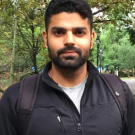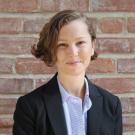Fall 2020 Dissertation Grant Awardees
Congratulations to our Georgia Tech and UC Davis dissertation grant recipients for the Fall 2020 cycle! Our recent awardees are contributing to research on transportation equity, land use policy, carpooling, ridehailing, and emissions impacts!
Hongyu Lu | Civil and Environmental Engineering, Georgia Institute of Technology
Honyu's work proposes an extension to previous research of the high-resolution modeling framework to estimate the population exposure to traffic-related fine particular matter of 2.5 μm or smaller (PM2.5) at an individual/household level, with the input of travel paths, demographic information, and concentration profiles. The proposed extension focuses on additional uncertainty analysis associated with temporal spatial aggregation of input data through the modeling framework and expanded equity analysis based on household-level demographic data in the Metro Atlanta area.
Tian Xia | Civil and Environmental Engineering, Georgia Institute of Technology
Tian's research will evaluate the effects of newly constructed reversible express toll lanes in energy and environmental aspects, including impacts of vehicle energy consumption, greenhouse gas emissions, and criteria pollution emissions modeling. A state-of-the-science tools combining dispersion model AERMOD, emission model of conventional vehicles MOVES-Matrix, and emission model of Alternative Fuel Vehicles (AFVs) Autonomie are expected from Tian's research.
Ziyi Dai | Transition Systems Engineering, Georgia Institute of Technology
Ziyi's project will assess the energy and emissions impacts associated with the potential purchase of EVs and the adoption of EVs to specific trips in Georgia households, using household socio-demographic attributes and trip-specific characteristics as input variables. The modeling framework used for this research is scalable, can be applied to specific regions and states, and can be used to estimate the future EV market penetration and adoption of EVs to specific trips, making the tools useful in a variety of transportation studies, such as promotion of alternative fueled vehicles via incentive programs.
Diyi Liu | Transportation Engineering, Georgia Institute of Technology
Diyi's research will develop an analytical framework for assignment of individual vehicular trips into viable carpooling/vanpooling trips under a set of restrictions considering spatiotemporal and economic restrictions using the output of the activity-based travel demand model. Diyi's work will evaluate the systemic efficiency and robustness of intelligent carpooling/vanpooling systems, estimate the economic feasibility in terms of using carpools/vanpools among potential SOV commuters, and estimate the traffic and environmental impact of the system.
Jai Malik | Transportation Technology and Policy, University of California, Davis

Jai's dissertation will create a deeper understanding of ridehailing services (e.g. Uber) and the COVID-19 pandemic on mobility trends in the U.S. The project will create a deeper understanding of how the factors influencing the use of shared ridehailing (UberPool/Lyft Shared) differ from those affecting the use of solo-ridehailing (UberX). Jai will develop a model and build new accessibility measures to remedy some of the methodological issues identified in the recent studies on the subject. This research will also identify the population segments (1) who lost their jobs during the pandemic, (2) who physically reported to work (vs. telecommuting), and (3) who had the liberty of reporting less frequently to work than others.
Jai's dissertation grant is funded by the Pacific Southwest Region University Transportation Center.
Amy Lee | Transportation Technology and Policy, University of California, Davis

Amy's research will investigate two crucial components of climate mitigation. Land use and transportation systems are critical determinants of vehicle miles traveled (VMT). But to attain the reductions that are necessary, (1) land use policy must allow for more compact development in existing urban areas so that more people can live closer to daily activities like work, school, and stores, and (2) transportation systems must provide viable options besides the automobile, and new investments in transportation infrastructure must align with the state’s multi-modal goals and VMT reduction targets rather than continue status quo investment patterns that prioritize automobility and highway expansion. Amy's investigation will focus on the context in which land use and transportation policies are created – the "who, what, and why" of political influence.
Mark Lozano | Energy Systems, University of California, Davis

Mark's research will develop a novel application of life cycle assessment and life cycle cost effectiveness that considers the changes in local pollutants across the various lifecycle phases of greenhouse gas reduction strategies. This investigation will survey stakeholders across the state to explore: the factors that define their sustainability plans, their current approach to strategy prioritization, and the opportunity for them to include the methodology that is developed in this dissertation.
